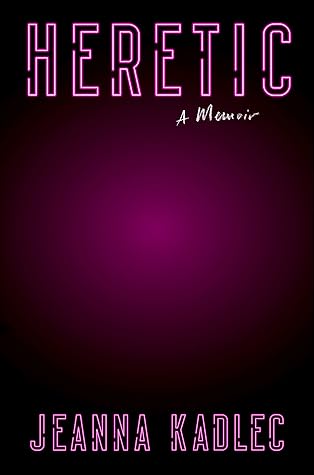More on this book
Community
Kindle Notes & Highlights
Read between
April 27 - May 7, 2024
The pursuit of one’s own religious “freedom” is a convenient justification for terrorizing others;
I’d both witnessed and been on the receiving end of explicit abuses of power by the kinds of authorities who we’d been told were supposed to protect and encourage us, not demean and control us, in Jesus’ name.
preferred to funnel all my emotional turbulence toward an obsessive relationship with faith.
My mother’s focus on the End Times at the expense of real-world accumulation wasn’t just an affinity for Puritanical asceticism, but also a form of dissociation from the debilitating trauma of her daily life,
In an alternate timeline, there is no Tony; there is just me, in a world where I was not raised to repress and sublimate my feelings and desires, but to notice them, to respect them, to honor them. Where I had language for my experience.
I have no idea how to write what I am thinking without turning it into a prayer: a petition, a question, a conversation in which the answer lies outside myself. If I am not ultimately directing my thoughts and questions toward God, who am I directing them to? A self? Myself?
I am realizing—for the first time in my adult life—that I do not know who I am, that I have no idea what I want, or how to think without an interlocutor and a set of guidelines.
So, tarot. A practice that turns the question around, in which I am trusted to have the answers that I seek. A foreign concept.
I had left a religion that had defined my old sense of self and purpose, had been the basis for most of my now-severed relationships. Could I ever belong again?
the desire to do better and right the wrongs I have committed in the name of a god I no longer believe in, motivated by a wild, unacknowledged hurt and guilt that will only grow with time, plunging forward without stopping to take stock of how my former beliefs still inform the methods of thought and action I am employing.
The Horde cannot tolerate difference, and its structure is built on driving friends, family, and loved ones apart if they will not submit to its singular worldview.
But Jesus’ prioritization of faith family over blood family always appealed to me.
for me, finding friends who speak the same language as I do could create a network of family.
being raised in religious fundamentalism, it’s a lens you always have, a language you always speak.
I come to church so I can try to feel something, but all I feel is exile.
“One of the most malevolent characteristics of racist thought,” Toni Morrison wrote, “is that it seems never to produce new knowledge.”*
What unites millennials and Gen Z alike is a devastation of institutional trust, one that clearly extends to religion.
Today, when friends share a difficult thing happening in their lives and I know (or suspect) they might be receptive, one of the first questions I ask is: Can I pull a card for you? Not because I think the cards have the answer, exactly. But because the cards open up an opportunity for more dialogue, for more questions, but also for intimacy, for connection—for relationship building. They offer those I love the comfort of knowing that I’m here to support them, however I can. Much as I used to do with prayer, all those years ago.
Evangelicalism builds a prison inside a person, but the truth will set you free.
I could say the quiet parts out loud and learn that I can be truly loved,
This is what the church wanted us to fear, but it is, in fact, the erotic that they fear, women and queers and people the world over imbued with the force of its grounded confidence and power. Tenderness and joy and pleasure can be found outside the Garden. Lilith’s daughters are skilled at making a communal oasis in what appears, to others, to be a desert. We always have been.
My spirit riles up. I knew him, I want to scream at folks—including my mother—who suggest to me that I didn’t know him well enough.
I have a personal grudge against Jesus, you could say—a spirit I feel abandoned by.
same family environment, polar-opposite outcomes.
This is something I see with a lot of folks I meet who are ex-evangelical—we were so all-or-nothing that, in the end, once it became clear that having it all wasn’t an option, it had to be nothing. There wasn’t any room for grace.
Leave it behind. Burn it down. Go build something new. And know this: You aren’t alone. You were never alone. The damage the church has done is extraordinary; witness the wake of its destruction, of its spiritual abuse and political maneuvering.
Learning to choose myself has not been easy. It has upset a lot of people who have historically benefited from my subservience and lack of self-knowledge. But it’s true what they say: When you say no, you get to say yes. I have let the no fill my mouth like a sacrament, like Job 38:11 (KJV): “Hitherto shalt thou come, but no further.” When the no drops, a gate slamming into the ground, everything that no has made room for becomes clearer. More space. More presence. More love. More mindfulness. Less bullshit.


